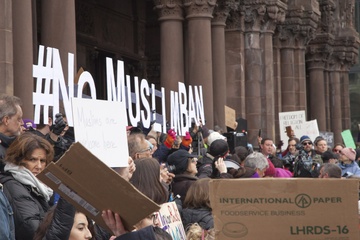When asked if any specific childhood memories inspire his work, Harvard Muslim chaplain Khalil Abdur-Rashid cites a story passed down to him from his father.
In college, Abdur-Rashid’s father was the victim of a racially-motivated attack on his way to a Bible study taught by Martin Luther King Jr.
King could tell that Abdur-Rashid’s father had been in a fight, Abdur-Rashid says —“It was obvious.” He responded with a lesson on non-violence. “Dr. King had told my father that as long as you respond in kind to violence and other people's hatred... you'll always be a slave,” Abdur-Rashid says.
Abdur-Rashid’s parents taught him similar lessons. As the first black mayor of Stone Mountain, Georgia, his father had to combat issues of racial hatred and violence. His mother confronted the fundamental meanings of black identity and representation as an artist and educator.
“I came through chaplaincy from those two inspirations,” Abdur-Rashid says.
The uptick of discrimination against Muslim-Americans after 9/11 motivated him to pursue a career in the profession. “I got into chaplaincy with the desire to try to combat a lot of negative stereotypes and support students in understanding their role, particularly as Muslims, in America,” he says.
Today, Abdur-Rashid is the only full-time Muslim chaplain at Harvard. In the wake of a January executive order barring immigration from several Muslim-majority countries, University President Drew G. Faust instituted a search for a full-time Muslim chaplain.
For many, though, the exact role of a chaplain is not clear. “Folks don’t know what that means,” Abdur-Rashid says. “You had to Google it, right?”
Abdur-Rashid works with students in a variety of different contexts. Some duties are tied directly to religion—he counsels individual students and delivers the sermon for the Harvard Islamic Society’s Friday prayers. Others are more informal, like when he frequents House dining halls, or introduced himself to freshmen and their families on move-in day.
His work is also academic—he often guest lectures and hosts informal, seminar-style classes. Along with other chaplains at the University, he plans to hold a program in the spring on the intersection of food with spirituality and mental health.
Instead of being associated with the Divinity School or a local mosque, Abdur-Rashid’s position was attached to the Office of the President, a move he feels gives the role a special significance.
“It centralizes the role of faith and spirituality, across the University as a whole,” he says. “This is a resource that the University [offers], in the same way they offer the resource of counseling services, or the Bureau of Study Counsel offers academic guidance.”




